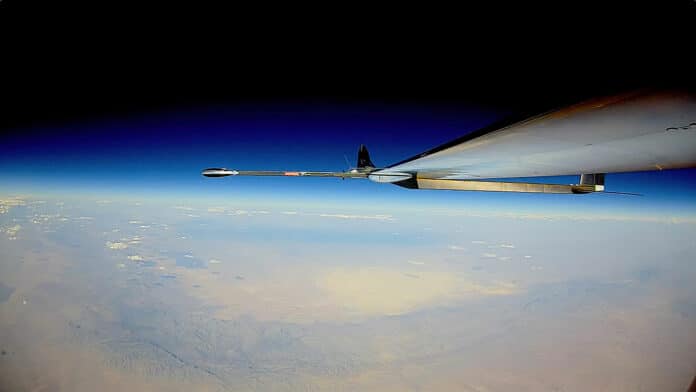BAE Systems has successfully completed a stratospheric flight trial of its High-Altitude Pseudo Satellite (HAPS) Uncrewed Aerial System (UAS) – PHASA-35.
In a sky-high, 24-hour test flight, the solar- and battery-powered drone soared to more than 66,000 feet (20,000 meters), reaching the stratosphere, before landing successfully.
The recent trial by the team of British engineers was conducted from Spaceport America in the White Sands Missile Range in New Mexico on June 25, 2023. The mission allowed engineers to assess the performance of the experimental solar-electric drone within the outer reaches of the planet’s atmosphere.
The flight represents a new phase in the PHASA-35 project, which began in 2018 and made its maiden flight in early 2020. The latest trials are sponsored by the US Army Space and Missile Defense Command Technical Center.
The PHASA-35 solar-electric UAV is designed to deliver a range of cutting-edge combat air capabilities to the UK and its allies. It has the potential to provide a persistent and stable platform for various uses, including ultra-long endurance intelligence, surveillance, and reconnaissance, as well as security.
Designed as a cheaper alternative to conventional airborne and satellite systems for commercial applications, the aircraft also has the potential to be used as part of communications networks to provide 4G and 5G coverage. It could be used in a wide range of applications, such as disaster relief and border protection, as an alternative to traditional airborne and satellite systems.
Featuring a 35-meter (115 ft) wingspan and a weight of 150 kilograms (330 lb), the aircraft can operate in the stratosphere. The drone includes advanced composites, energy management systems, ultra-lightweight solar electric cells, and photo-voltaic arrays to provide energy during the day, which is stored in rechargeable cells to maintain flight overnight. It can potentially stay airborne for 12 months.
“PHASA-35 is breaking new ground – opening up the stratosphere to new possibilities,” said Cliff Robson, Group Managing Director for BAE Systems’ Air Sector. “The team, which brings together BAE Systems’ know-how from across the globe with innovative solar and power management technologies, demonstrated tremendous commitment and ambition as they tackled the challenges associated with novel technologies and approaches. This partnership approach is key to our ability to enhance our defense expertise with new thinking and technologies.”
